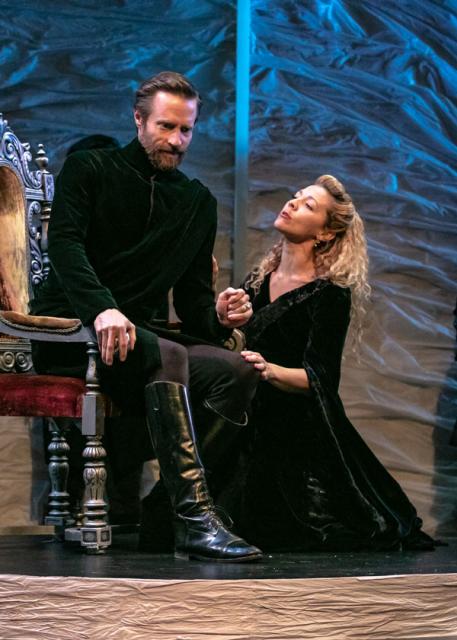
You can really feel the chill of winter in the Shakespeare Theatre of New Jersey's production of Shakespeare partly morose, partly magical A Winter’s Tale. The affection and attention given to the Bard’s late-in-life play is obvious in the direction of Bonnie J. Monte. It may be considered a lesser work, but it has remained an audience favorite. Whether or not it is the best choice for a holiday entertainment is a matter of taste. The convoluted, preposterous plot, charged as it is with an essentially unmotivated story, is presented within a world of tufted snow-white moveable panels created by designer Brittany Vasta. They effectively frame the subdued palette of the costumes designed by Nikki Delhomme. Immersion into the plot isn’t all that difficult. Shakespeare pulls out his melodramatic hand-grenade early on. In the story, Leontes, the king of Sicilia, suddenly goes mad with jealousy because he suspects (for no apparent reason) and then accuses his pregnant queen Hermione of not only having had an affair with their house guest, his best friend Polixenes, the king of Bohemia, but that he is the baby’s father. Paradoxically, after the play’s first half in which we see how a distressingly paranoid monarch incredulously slanders, humiliates, alienates, and even destroys most everyone he holds dear, we are treated to a second half all bathed in sweetness and light (with a significant assist from lighting designer Tony Galaska) to making everyone live happily ever after. The Winter’s Tale makes up for its lack of coherence and cohesiveness in its ability to provoke our continued interest. And certainly its rush of exquisite lyricism is not to be overlooked. Monte, whose creative instincts have enhanced many productions at this theatre for twenty-eight seasons keeps this intriguingly lopsided and fragmented play moving along. She adorns the play’s fantastical element by the increased presence of Father Time (Raphael Nash Thompson) who appears now and again to comment on the action in a silver robe holding an hour-glass scepter. Monte gives this undeniably make-believe world, in which time and reality run amok, a pro-active energy that emphasizes the play’s confounding psychological aspects. Although it is hard to forgive the Leontes of Jon Barker for his impetuously mindless stupidity, the character he creates comes back to haunt us. His difficult-to-swallow redemption does not preclude, however, our need to evaluate his behavior. John Keabler makes the most of the maligned Polixenes’ resort to gallantry under the circumstances. So is Erin Partin’s display of patience-in-adversity as that “precious creature” Hermione. Marion Adler was a burst of feminine fury as Paulina, the court physician and resident loudmouth. Courtney McGowan, as the long-lost daughter Perdita, and Ryan Woods as the a-wooing Prince Florizel impressed as the lovesick teens. The small but important role of the king and queen’s ill-fated young son Mamillius was earnestly played on opening night by Jeff Lin (alternating with Xander Egbert-Crowe) with a desire to prove that there is no such thing as a small part. Not generally moved to laughter by the antics of most Shakespeare’s comical characters, I found William Sturdivant as the roguish Autolycus and Seamus Mulcahy as the imbecilic young shepherd funny indeed. With its romantic innocence tainted by macabre undertones and its gorgeous poetry tested by melodramatic excess, The Winter’s Tale makes uncompromising appreciation difficult, but Monte’s elegant staging and the overall excellence of the acting make a case for it as an antidote to the usual holiday entertainment.
